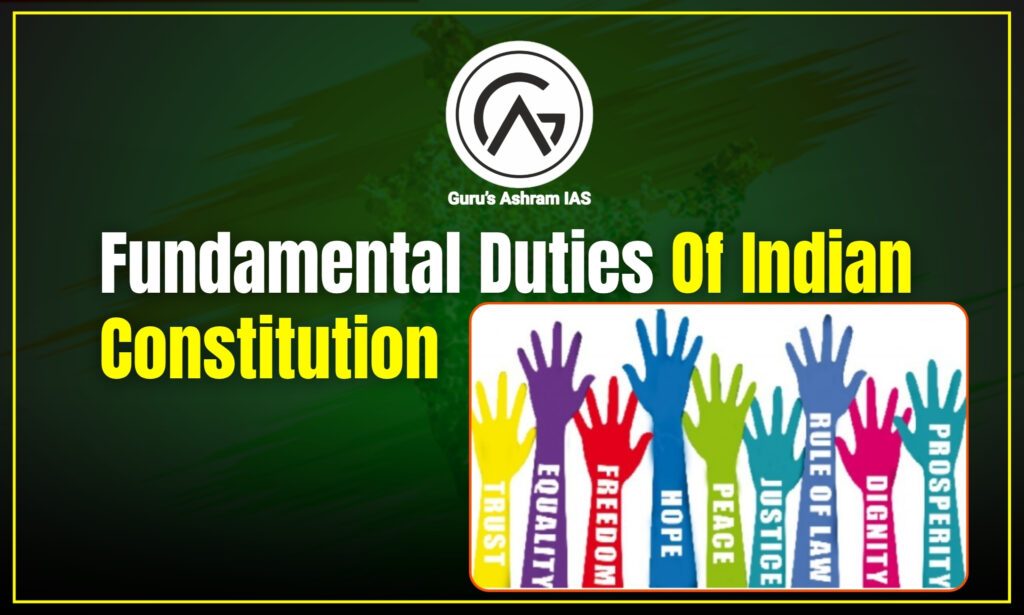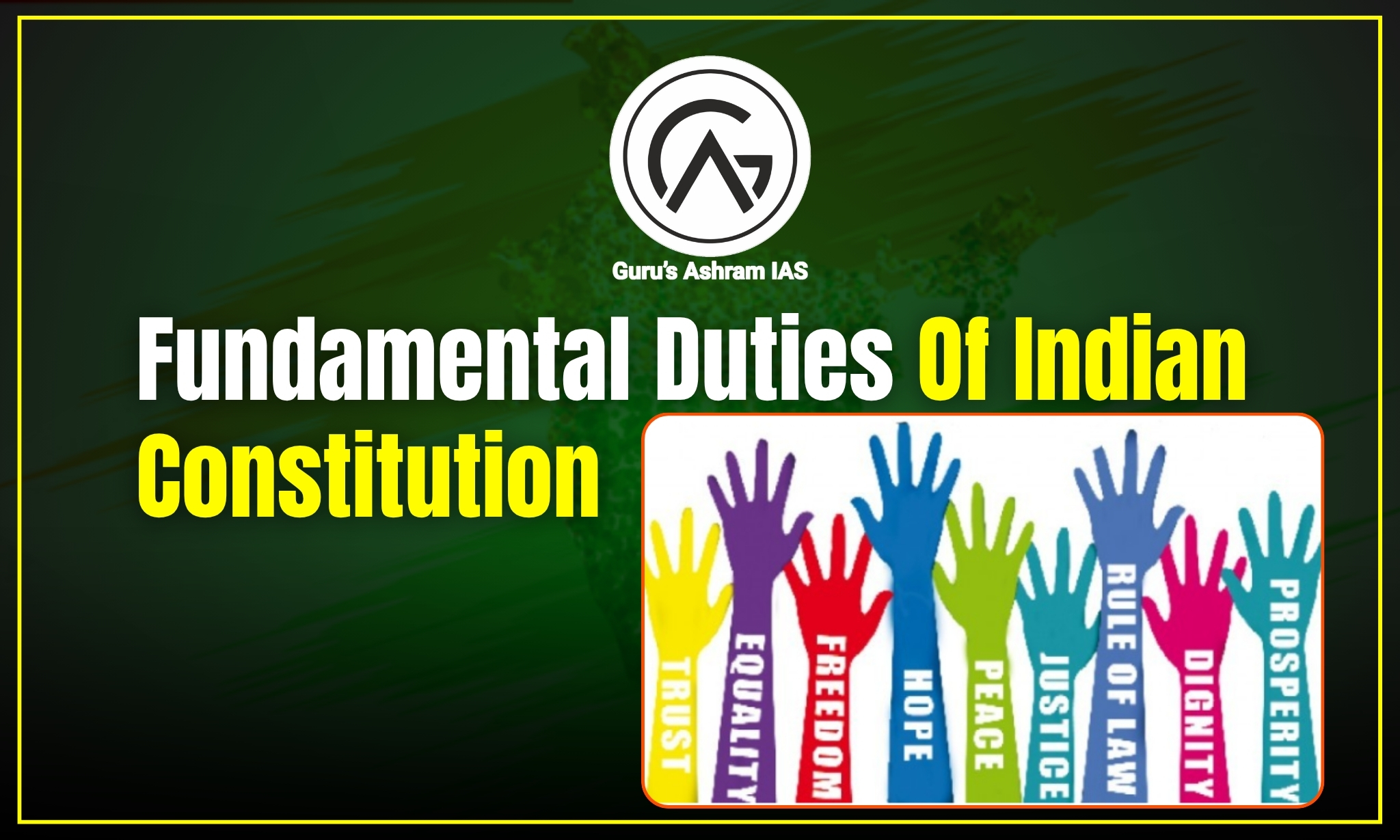Fundamental Duties Of Indian Constitution
Picture yourself in a small town square on Independence Day, the air buzzing with excitement. Kids wave tiny tricolors, and an old speaker crackles with “Vande Mataram.” As the flag unfurls, you feel a swell of pride—not just for the freedoms you cherish but for the quiet promise you make to give back to India. This promise lives in the Fundamental Duties Of Indian Constitution, 11 responsibilities etched in Article 51A under Part IV-A. Unlike laws that demand obedience, these duties are a heartfelt invitation to every Indian to build a nation that’s united, green, and just. Let’s dive into the story of these duties—where they came from, what they mean, why they matter, and the debates they spark—while exploring how they weave together with Fundamental Rights and Directive Principles Of State Policy to shape India’s heart. Whether you’re a UPSC aspirant hunting for insights or a citizen curious about What Are The 11 Fundamental Duties, this journey will light the way.
-
Daily Quiz Telegram Channel: Click to Join
-
Guru’s Ashram IAS Telegram Group: Click to Join
-
Click To Join Guru’s Ashram IAS Official Whatsapp Channel :- (https://whatsapp.com/channel/0029Va68jla0AgW6JrNUzb44)
-
Click To Join Our Telegram Group Click Here:- ( https://t.me/gurusaashram )
-
Click To Join Our Whatsapp Group Click Here:- ( https://chat.whatsapp.com/J4HYp7p6jFa0wOpA644Sur )
Click Here To Call us now!
Enquiry Here, Fill this form & Ask the Questions
Understanding Fundamental Duties: A Citizen’s Promise
The Indian Constitution is like a family pact, written to guide a nation of 1.4 billion. It’s famous for Fundamental Rights (Article 12 To 35), which guard your freedom to speak, pray, and dream. These rights, detailed in the Fundamental Rights Of Indian Constitution PDF, are your armor against injustice. But a family doesn’t thrive on protection alone—it needs everyone to pitch in. That’s where the Fundamental Duties come in, a set of 11 moral calls added in 1976 and expanded in 2002. They’re not legally binding—no judge will rap your knuckles for skipping them—but they carry a quiet power, urging you to live with purpose.
What Is Fundamental Duties?
They’re a love note to India’s spirit, blending the courage of freedom fighters, the wisdom of ancient sages, and a nod to the Fundamental Duties Borrowed From the Soviet Union’s Constitution, which valued civic duty. These duties ask you to honor your roots, care for your land, and bridge divides in a nation bursting with diversity. They’re not rules but a way to join India’s grand adventure, as vital as the 6 Fundamental Rights In India or the Directive Principles Of State Policy.
The Birth of Fundamental Duties In Constitution Of India
When the Constitution of India was unveiled on January 26, 1950, it was a beacon of hope. Crafted by Dr. B.R. Ambedkar and the Constituent Assembly, it gifted citizens Fundamental Rights and set state goals via DPSPs. But it didn’t ask citizens what they owed back. For 25 years, this worked—India was a young republic, healing from colonial scars. Then came the Emergency of 1975–1977, a turbulent time when democracy faltered, and cracks appeared in national unity. It was like a ship caught in a storm, needing every hand on deck.
Prime Minister Indira Gandhi formed the Swaran Singh Committee in 1976, led by the wise Sardar Swaran Singh, to strengthen the Constitution. The committee looked to the Soviet Union, where citizens had duties alongside rights, and proposed a similar balance for India. They suggested eight duties, but the government dreamed bigger. Through the Fundamental Duties Amendment via the 42nd Amendment Act of 1976, dubbed a “mini-Constitution,” ten duties were enshrined in Article 51A under Part IV-A. In 2002, the 86th Amendment Act added an 11th duty, linking to the Right to Education (Article 21A). This journey shows how India grew to see citizenship as a two-way street, a theme often explored in Fundamental Duties UPSC questions.
What Are The 11 Fundamental Duties? A Citizen’s Map
Let’s explore the Fundamental Duties List, not as a dry roster but as a guide for living as an Indian, each duty a brushstroke in the nation’s portrait. Imagine these as 11 Fundamental Duties With Pictures: a flag waving, a river sparkling, a classroom buzzing. Here’s the Fundamental Duties Article in action:
- Respect the Constitution and Symbols: Cherish the Constitution of India, its ideals, and symbols like the National Flag and Anthem. Imagine standing at a school flag-hoisting, heart full as “Jana Gana Mana” echoes. This duty, part of the Fundamental Duties PDF, asks you to uphold justice and equality, whether voting or discussing laws over chai.
- Honor the Freedom Struggle: Value the sacrifices of freedom fighters—Gandhi’s marches, Subhas Bose’s battles, countless local heroes. It’s like tending a flame passed down from 1947. Share their stories or visit a memorial to keep their dreams alive.
- Protect India’s Unity: Safeguard the nation’s sovereignty and togetherness. With 22 official languages and endless traditions, this duty means celebrating diversity, not division. Befriending a colleague from another state or shutting down hate speech stitches India’s fabric tighter.
- Defend the Nation: Be ready to serve India, from joining the army to aiding flood victims. Picture soldiers in Siachen or volunteers packing relief kits. This duty is about answering India’s call, big or small.
- Foster Harmony: Build brotherhood across religions, castes, and regions, rejecting practices that harm women, like dowry. Inviting a neighbor to Diwali or Holi, regardless of faith, or speaking against gender bias makes India warmer, aligning with Fundamental Rights like equality (Article 14).
- Preserve Culture: Protect India’s heritage—temples, dances, manuscripts. From Ellora’s caves to a Bihu festival, this duty keeps India’s story vibrant. Learn a folk craft or visit a museum to pass it on.
- Care for Nature: Nurture India’s rivers, forests, and wildlife. With the Yamuna choking and leopards vanishing, this duty begs you to plant trees or skip plastic. Every reusable bottle you carry heals the earth a bit.
- Think Scientifically: Embrace reason, challenge myths, and stay curious. This duty powers India’s tech leaps and fights superstitions. Fact-checking a viral post or sparking a kid’s “why” fuels progress.
- Guard Public Property: Treat public spaces—buses, parks, libraries—like your home. Choose peace over vandalism. Cleaning graffiti or reporting damage says, “This belongs to us.”
- Aim for Excellence: Strive to shine in studies, work, or art. Think of ISRO’s moon missions or Neeraj Chopra’s javelin gold. Your effort, no matter the field, lifts India higher.
- Educate Children: Ensure kids aged 6–14 attend school, added via the Fundamental Duties Amendment in 2002. Paired with Article 21A, this duty bets on education to shape India’s future. Tutoring a child or donating books changes lives.
These 10 Fundamental Duties (plus the 11th) aren’t chores—they’re threads in India’s tapestry, woven through acts like smiling at a stranger or saving a sapling.
Why Fundamental Duties Of Indian Constitution Matter
The Fundamental Duties Of Indian Constitution are like the roots of a banyan tree, anchoring India’s democracy. They’re not laws but moral calls that shape our identity. Here’s why they’re vital, a key point in Fundamental Duties Notes PDF:
- Balancing Rights and Duties: Fundamental Rights Of India, like free speech (Article 19), let you soar, but India Fundamental Duties keep you grounded. Enjoying rights while fostering harmony (Article 51A(e)) ensures a fair democracy, a theme in Fundamental Rights And Duties.
- Uniting Diversity: India’s a mosaic—Hindu, Muslim, Tamil, Assamese. Duties like promoting brotherhood (Article 51A(e)) and unity (Article 51A(c)) tie this diversity into one song, echoing the Fundamental Rights In Hindi call for equality.
- Protecting Nature: With rivers dying and forests fading, Article 51A(g) is a cry to live green. Choosing cloth bags or joining a cleanup drive keeps India livable, aligning with DPSPs like Article 48A.
- Sparking Patriotism: Respecting the flag (Article 51A(a)) or defending the nation (Article 51A(d)) ignites love for India. Standing for the Anthem or volunteering in a crisis makes you a patriot, a value in Fundamental Rights And Constitution Of India.
- Guiding Courts: Judges use duties to test laws. A 1992 Supreme Court ruling said laws tied to duties are “reasonable” under Articles 14 and 19, giving duties clout, as noted in Fundamental Rights UPSC materials.
- Building Better Citizens: Duties like scientific thinking (Article 51A(h)) or non-violence (Article 51A(i)) mold kind, curious people. They’re a blueprint for a society that lifts each other up.
These duties are a vow to keep India’s 1947 dream alive, a core idea in Fundamental Duties In Hindi and English.
Fundamental Rights: The Other Half of the Story
To grasp Fundamental Duties, we must explore What Are Fundamental Rights. The Fundamental Rights Of Indian Constitution, spanning Articles 12 to 35, are six pillars ensuring dignity and freedom:
- Right to Equality (Articles 14–18): Equal before law, no discrimination, equal job opportunities, no untouchability or titles. It’s why a street vendor and a CEO stand equal in court.
- Right to Freedom (Articles 19–22): Free speech, movement, profession, plus protection from unfair arrests. This lets you protest or travel freely.
- Right Against Exploitation (Articles 23–24): Bans forced labor and child work in factories. It protects kids from hazardous jobs.
- Right to Freedom of Religion (Articles 25–28): Practice and spread your faith, manage religious affairs, avoid forced religious taxes. It’s why India celebrates Eid and Durga Puja side by side.
- Cultural and Educational Rights (Articles 29–30): Protect minority cultures and schools. It ensures Tamil or Urdu thrives in schools.
- Right to Constitutional Remedies (Articles 32–35): Approach courts to enforce rights via writs like habeas corpus. It’s your legal lifeline.
These 6 Fundamental Rights Of India, detailed in Fundamental Rights PDF, are enforceable, unlike How Many Fundamental Duties Are There In Indian Constitution (11, non-justiciable). Together, they balance freedom and responsibility, a key UPSC theme.
Directive Principles Of State Policy: The State’s Compass
The Directive Principles Of State Policy (DPSPs), in Part IV (Articles 36–51), are the government’s to-do list for a just society. Non-justiciable like duties, they guide laws on environment (Article 48A), heritage (Article 49), or education (Article 45). Duties like protecting nature (Article 51A(g)) or culture (Article 51A(f)) mirror DPSPs, urging citizens to join the mission. The Preamble’s ideals—justice, liberty, equality, fraternity—tie rights, duties, and DPSPs into a vision where everyone contributes, a point stressed in Fundamental Rights Notes PDF.
Features of Fundamental Duties: Their Unique Flavor
The Fundamental Duties Of Indian Constitution Article stand out for their distinct traits, a favorite UPSC topic:
- Non-Justiciable: No legal penalty for ignoring them, unlike Fundamental Rights Article. They’re moral nudges, sparking debate about their impact.
- Citizens Only: Apply to Indians, not foreigners, unlike some Fundamental Rights Of Indian Constitution (e.g., Article 14). This tightens the citizen-nation bond.
- Global and Local Roots: Fundamental Duties Borrowed From the Soviet Constitution, mixed with Gandhi’s duty ethos and India’s reverence for nature. They’re both Indian and universal.
- Moral and Civic Mix: Moral duties (e.g., freedom struggle, Article 51A(b)) touch the heart; civic ones (e.g., Constitution respect, Article 51A(a)) shape actions.
- Indian Values: Duties like caring for rivers (Article 51A(g)) echo traditions of worshipping nature. They codify India’s way of life.
- Behavioral Guide: Like a compass, they point to responsible choices—recycling, staying peaceful—building a thoughtful society.
These traits make duties a bridge between India’s past and future, a focus in Fundamental Duties UPSC.
Courts and Fundamental Duties: A Quiet Influence
The Supreme Court has uplifted Fundamental Duties, despite their non-justiciable nature. Two cases shine:
- Shri Ranganath Mishra vs. Union of India (2003): The Court urged duties to be cultural norms, not just laws, backing the Justice J.S. Verma Committee’s push to teach them in schools. Picture kids learning unity (Article 51A(e)) with math—a vision for Fundamental Duties In Constitution Of India.
- AIIMS Students Union vs. AIIMS (2001): Duties are as vital as Fundamental Rights, both “fundamental” to India’s soul. This elevates duties, a key point in Fundamental Rights Fundamental Duties.
These rulings show duties shape laws and hearts, even without courtroom teeth.
Critics of Fundamental Duties: The Other Side
Not everyone loves the Fundamental Duties Of Indian Constitution Taken From Which Country (Soviet Union). Critics raise valid points:
- No Legal Power: Non-justiciable, so no fines for ignoring them. Critics call them poetic but toothless, questioning their role in How Many Fundamental Duties (11).
- Vague Terms: “Noble ideals” (Article 51A(b)) or “composite culture” (Article 51A(f)) confuse. What do they mean in a busy bazaar? This fuzziness distances duties.
- Incomplete List: No mention of voting or taxes, though the Swaran Singh Committee suggested taxes. This feels like a half-baked recipe, a critique in Fundamental Duties PDF.
- Poor Placement: In Part IV-A, after Fundamental Rights (Article) and DPSPs, duties seem secondary. Critics say they deserved Part III’s spotlight.
- Missed Penalties: The Swaran Singh Committee wanted fines for non-compliance, immune to rights-based challenges, but this was rejected, weakening duties.
- Low Awareness: Many Indians don’t know What Are The 11 Fundamental Duties. Rights grab headlines; duties stay quiet. More campaigns are needed.
These critiques challenge India to make duties clearer and louder, a UPSC discussion point.
Fundamental Duties in Action: Real Stories
Let’s meet Indians living the Fundamental Duties List, proving they’re not abstract:
- Meena, the Eco-Warrior: In Kerala, Meena, a fisherman’s wife, leads a beach cleanup, inspired by Article 51A(g). Her team has saved turtles, showing Care for Nature in action.
- Rahul, the Unity Builder: In Delhi, Rahul, a Sikh shopkeeper, hosts interfaith prayers after tensions, guided by Article 51A(e). His shop is a peace hub, embodying Foster Harmony.
- Lakshmi, the Culture Keeper: In Tamil Nadu, Lakshmi, a weaver, teaches kids Kanchipuram sari designs, following Article 51A(f). Her looms keep tradition alive, a vivid Preserve Culture picture.
- Arjun, the Science Star: In Bengaluru, Arjun, a techie, debunks fake news for seniors, driven by Article 51A(h). His workshops spark Think Scientifically, fighting misinformation.
These stories, like 11 Fundamental Duties With Pictures, show duties thrive in daily acts, from saving beaches to sharing prayers.
Fundamental Duties UPSC: Your Exam Toolkit
For UPSC aspirants, How Many Fundamental Duties Are There In Indian Constitution (11) is a hot topic across Prelims, Mains, and Interviews. Here’s your edge:
- History: Know the Fundamental Duties Amendment (42nd, 1976; 86th, 2002) and Fundamental Duties Of Indian Constitution Taken From Which Country (Soviet Union). The Swaran Singh Committee is a frequent question.
- Non-Justiciable: Unlike Fundamental Rights Of Indian Constitution, duties aren’t court-enforceable, like DPSPs. Contrast this in Fundamental Rights UPSC answers.
- Moral vs. Civic: Moral duties (e.g., Article 51A(b)) vs. civic (e.g., Article 51A(a)). MCQs test this split.
- Citizens Only: Duties for Indians, unlike some How Many Fundamental Rights (6) that apply broadly. Note this nuance.
- Cases: Shri Ranganath Mishra (2003) (social sanctions) and AIIMS Students Union (2001) (duties equal rights) add Mains depth.
- Trends: Link duties to news—e.g., Article 51A(g) and Swachh Bharat. A Mains question might be: “How do Fundamental Duties In Hindi support unity?” Use examples like interfaith events.
- Answer Tip: Blend facts (e.g., Fundamental Duties Article) with stories (e.g., Namami Gange for Article 51A(g)). In Interviews, share how you’d live Fundamental Rights And Duties, like promoting equality.
Study with Fundamental Rights (Article 12 To 35 PDF) and DPSPs for a constitutional grip.
Fundamental Duties Today: Challenges and Hopes
In 2025, India faces climate crises, social divides, and tech booms. Fundamental Duties offer a path, but hurdles remain:
- Climate Urgency: Article 51A(g) aligns with Jal Jeevan Mission, but citizens must act—compost, save water. Many don’t see these as India Fundamental Duties.
- Harmony Needs: Article 51A(e) fights polarization. Interfaith meets or anti-bias campaigns work, but social media hate is a challenge.
- Digital Era: Article 51A(h) suits India’s AI race, but fake news spreads fast. Digital literacy is key, tough in rural areas.
- Education Gap: Article 51A(k) backs NEP 2020, but poverty keeps kids out of school. Community tutoring helps, but it’s slow.
- Awareness Lack: Fundamental Duties Day (January 6) tries, but duties need louder campaigns—TV ads, school plays—to rival Fundamental Rights In Hindi.
These show duties are tools for today’s fights, if embraced.
Making Fundamental Duties Real
Fundamental Duties won’t change India unless lived. Here’s how:
- Schools: Teach duties as stories, not civics. Kids cleaning parks (Article 51A(g)) or staging unity skits (Article 51A(e)) make learning fun, like a Duty Day.
- Homes: Families can share freedom struggle tales (Article 51A(b)) or model respect for women (Article 51A(e)). Discuss voting’s value, even if not a duty.
- Communities: Host tree drives or heritage walks. Honor locals like Meena or Rahul, using #DutyHeroes to spread Fundamental Duties In Hindi.
- Policy: Laws like eco-rules (Article 51A(g)) or equality acts (Article 51A(e)) can embed duties. Shri Ranganath Mishra (2003)’s social sanctions mean neighbors praising green acts work.
- You: Start small—reuse bags, fact-check, tutor a kid. As Gandhi said, “Be the change”—duties make it real.
A Pledge for India
Fundamental Duties Of Indian Constitution aren’t just words—they’re a song for India. They ask you to salute the flag, save a river, embrace a neighbor, and chase dreams. They’re daily heroics—recycling, voting, teaching—building India brick by brick. With Fundamental Rights and DPSPs, they craft a nation that’s just, green, and proud. In 2025, as India faces global challenges, these duties are our guide. So, let’s pledge: live the 11 Fundamental Duties, not because we must, but because we love an India that shines. Pick one today—plant a tree, share a smile, sing a folk tune—and watch India grow, one heartbeat at a time.
FAQ’s of Fundamental Duties






